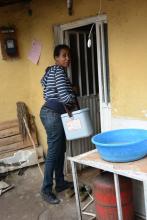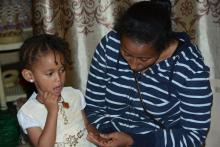Immunization will not be successful without Women Health Workers
Health workers in Ethiopia are mostly women and they are playing a key role in immunization. In addition to many other responsibilities that they have, they are serving their communities by immunizing their children against vaccine preventable diseases towards saving lives of millions of children. Polio vaccination campaigns in Ethiopia rely on the commitment of local health workers who visit each and every house to ensure that no eligible child is left behind.
The health workers have supported the recent Polio National Immunization Days (NIDs) campaign in Ethiopia which was conducted from 22-25 April 2016 to vaccinate children with trivalent oral poliovirus vaccine (tOPV) just before switching to bivalent oral poliovirus vaccine (bOPV).
Wubtaye Geda, is one of the women vaccinators who has been playing a key role in the immunization of children in her community by vaccinating children as well as educating parents /care givers about the benefit of vaccines. In addition to serving as a clinical nurse in Janmeda Health center, she has been involved in different immunization campaigns including MenA, Measles and Polio.
“I have good knowledge about immunization. I have also equipped by a training before this campaign. Since I understand very well how vaccines can prevent children from different diseases that may lead them to temporary or permanent disabilities and even some times death; I feel very happy while vaccinating children to prevent them against such risks.” said Wubtaye.
Polio vaccinators are expected to go from house to house which is not an easy task. “Looking children growing healthy will make any one happy so that’s why I didn’t get tired and even feel that way when I engaged in such, house to house vaccination task. Instead I would enjoy knocking at each and every door to make sure if the children in the house have been vaccinated.” she added; “I would always get encouraged by thinking the impact of my role as a vaccinator towards preventing children from different diseases as well as its contribution to reduce child mortality in general.”
Wubtaye from Arada Sub city, woreda 06, kebele 11/12 would visit at least 80 – 120 houses each day during the campaign to vaccinate children. As expected, during the recent polio NIDs, the majority of the health workers who were involved in the campaign were women. The Federal Ministry of Health with support from partners, including WHO, trained the health workers before the campaign.
“My dream is to see that immunization of children would be continued even in a strengthen way by reaching more children and I am also happy for the new vaccinations like Rota and PCV that have been introduced in the country recently.”, Wubtaye finally concluded.
For more information, please contact:
Selamawit Yilma
EPI Communication Officer
email: yilmas [at] who.int
Photo: WHO Ethiopia\Selamawit Y.


